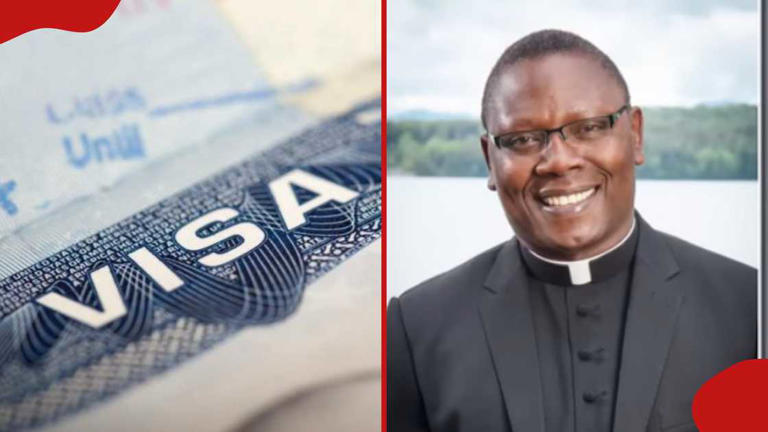- Details
- East Africa
- 477
- Kenyan-born Catholic priest Father John Ojuok is stranded in Nairobi after being denied a visa stamp needed to re-enter the US despite holding legal status
- He travelled to Kenya for a short three-week visit to see his mother, planning to renew his passport visa stamp while in Nairobi
- Father Ojuok serves as parochial vicar for three parishes in Lewis County: St. Peter’s, St. Mary’s, and St. Hedwig’s in the state of New York
A Kenyan-born Catholic priest is stuck in Nairobi after he was denied re-entry into the United States despite his legal status.
Father John Ojuok flew back home to visit his mother for what he thought would be a three-week trip, but the US embassy denied him a crucial visa stamp, extending his stay in Kenya for now three months.
The priest, who is the parochial Vicar at St. Peter's, St. Mary, and St. Hedwig's churches in Lewis County, New York, had planned to renew his passport visa stamp during his trip to Nairobi.
Details shared by 7News show that Ojuok went for the interview at the US embassy, but he was denied the visa stamp, thus barring his entry into America.
"Maybe they are thinking that he might extend his stay after his legal stay in the US expires," Father Christopher Carrara, Episcopal Vicar for Clergy, Diocese of Ogdensburg, told the TV station.
He was set to return to New York on September 11, but he is still in Nairobi.
Carrara said the Kenyan-born priest only carried personal effects that would last three weeks, as he thought that was how long he would stay.
The parish is now discouraging its immigrant religious leaders from travelling outside of the US, as the Trump administration tightens its immigration rules.
"I am pro legal immigration, but this extra scrutiny makes immigration of people with legal status more difficult. Our advice to them is, do not go home. Do not visit because Father John would have stayed and not gotten the visa stamp renewed, and he would still have been legal," he said.
The parish expressed its sadness over Ojuok's US re-entry troubles, citing his impactful contribution to the church.
However, all hope is not lost as the diocese is speaking with U.S. officials, including Representative Elise Stefanik, to help get Father Ojuok back to the United States.
The Father moved to the US in 2016 as a seminarian and studied Theology in New York. Before the US move, he was stationed in Rome for his studies.
He hails from Migori County, Kenya, and is the youngest of four siblings.
Kenyan man self-deports after 16 years
In other news, a US-based Kenyan man self-deported back to the country to avoid encounters with immigration officials.
Samuel Kang'ethe chose to leave the US on his own terms, saying he did not want to be arrested and forced back home in shackles.
He left his wife and three children in America. By






